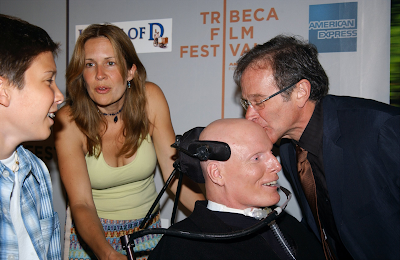Super/Man: The Christopher Reeve Story, directed by Ian Bonhote and Ettedgui, who cowrote with editor Otto Burnham, presents a look at the versatile actor's life, with special emphasis on his love of family, and his family's love of him, intensified by the equestrian accident that rendered him paralyzed. The movie commences with this upsetting event, and its consequences bracket the entire film. (In truth, much of the movie is told from the vantage of Reeve's children, Alexandra, Matthew and William, and they deserve tremendous credit for the content's most insightful portions.)
Of course, to do Reeve justice, his fruitful career must be acknowledged, in particular the way in which Superman: The Movie transformed him into a pop-cultural sensation. Though the documentary references the period, it uses it mainly as an undercurrent to Reeve's later, physical struggles, for as much as Kal-El had to overcome Kryptonite, so did the man who portrayed him, albeit on debilitating, terrestrial turf.
Alas, this tactic forces the film to bypass the majority of Reeve's creative work (along with any related commentary), above all, Somewhere in Time and his earliest exposure through the soap opera, Love of Life. (In the Gloaming, which Reeve directed, gets the most attention, perhaps as much as his Superman movies combined.) A substantial sum of the archival footage comes and goes, blurring the likes of Richard Donner, Johnny Carson, David Letterman, Jay Leno, Carol Burnett, Jimmy Carter and Ronald Reagan, though Robin Williams, Glenn Close, Brooke Ellison, Jeff Daniels, Susan Sarandon and Gae Exton (Reeve's first "spouse") do receive adequate exposure. (Still, Richard Lester, Gene Hackman, Marc McClure, Valerie Perrine, Sarah Douglas, Terence Stamp, Jack O'Halloran, Pamela Stephensen, Annette O'Toole, Annie Ross, Jane Seymour, Jeannot Szwarc, Anthony Hopkins, Michael Caine, Morgan Freeman, Daryl Hannah, John Carpenter, Mark Hamill, Tom Welling [for whom Reeve held great fondness] ... Michael Keaton [Reeve's Speechless costar] are still with us and could have been interviewed, even briefly, and so why not? Also, why so little of Margot Kidder? Archival footage of her recalling Reeve does exist, and it should have been included. Instead, we get smug, cackling cameos and talking-head commentary from political pundits, who for the most part, offer flat, obligatory views on Reeve without any convincing, I-knew-the-man sentiment. Gosh, thanks a million, CNN, but to a higher degree, shame on you, DC!)
Even with this misguided approach, Dana Reeve (Chris' ever devoted wife) and Robin Williams compensate for much of political pandering, as we watch their unflinching support drive Reeve to fight on and inspire others to do the same. In turn, we see how Reeve's selfless efforts led to life-affirming, medical procedures and behavioral perspectives that have helped those burdened by spinal-cord hindrances. (Ilan Eshkeri's heroic score performs a palatial service, in this respect, channeling John William's euphoric, orchestrated style to tie Reeve's artistic achievements to his impassioned campaigns, solidifying the valiant link with marked dignity and honor.)
Though flawed, Super/Man: The Christopher Reeve Story is still an affecting gem that the actor's fans, and anyone who admires those with the strength to rise above the odds, will appreciate and revisit during times when all seems too bleak to bear. Moreover, the movie lets audiences know the essentiality of Reeve's legacy and how impactful any person can be by following his humanitarian example.








No comments:
Post a Comment